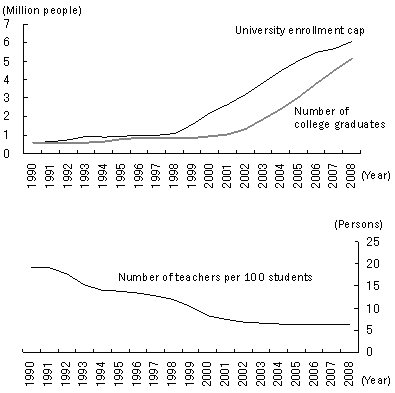In recent years, as the Chinese economy has been growing rapidly, the labor market has been tightening. However, the problem of a lack of employment opportunities for college graduates has shown no signs of abating. The single biggest cause lies in the oversupply of college graduates and the decline in the quality of university education, following a sharp increase in university enrollment caps. A mismatch between curricula and social needs only serves to exacerbate the problem.
In China, the enrollment caps at universities (including two- and three-year vocational schools) jumped from 1,084,000 in 1998 to 1,597,000 in 1999 (a rise of 47.3% year on year). The aim of this cap increase was to improve the quality of the workforce to support industry in the long term while also attenuating the short-term unemployment pressures that emerged in the wake of the Asian currency crisis. University enrollment caps have continued to increase, reaching 6,077,000 in 2008, and the number of graduates has increased sixfold over the last decade. In the labor market for college graduates, supply has been rising far more rapidly than the growth in demand linked to industrial upgrading. As a result, the labor market for college graduates has changed from a seller's market to a buyer's market.
Already in 2008, China's enrollment rate of university students reached 23.3%, and tertiary education has moved from elite to mass education. This has resulted in a decline in the average academic level of students who go to university, although it has helped to improve the educational standards of Chinese people overall. In addition, as the rise in university faculty numbers has been unable to keep pace with the rise in the number of students, the number of teachers per 100 students nearly halved between 1998 and 2008, and the average quality of university education also seems to have declined ( figure ).
Figure: Falling student-teacher ratio due to the rising enrollment limit of universities

(Source) China Statistical Abstract 2009
In a market economy, wages are determined in accordance with productivity, which in turn reflects the quality of labor. During its planned economy days, China did not have a labor market; college graduates had to follow the "assignments" handed out by government just as other workers did, and their wage level was set by the government based on the egalitarian principle. This system was revised in stages after China adopted the reform and open-door policies in 1978, and individuals have been free to make their own career choices since 1998. As a result, wage levels now reflect the balance of supply and demand in the labor market. In recent years, the starting salaries of college graduates have been growing at a sluggish pace, reflecting the decline in the average quality of graduates and oversupply. In 2008, starting salaries actually fell from the year-ago level, partly influenced by the economic downturn ( note1 ).
If graduates accept a wage at the new "equilibrium level" that reflects the increase in the quantity of college graduates and the decline in their quality, then there should be no oversupply. In reality, however, many graduates prefer not to accept lower wages for the sake of quick employment, and instead keep looking for a better-paid job. This has translated into higher unemployment among graduates.
In addition to problems with the quality of university education, universities are producing graduates who lack the skills that Chinese society needs, and this too is intensifying the job shortage for college graduates. In fact, looking at the employment rate by their major field of study, we notice that it is higher for students who major in engineering (90%), especially geology and mineral resources (97%), civil engineering (94%) and mechanical engineering (93%), while it is lower for those who major in philosophy (76%), law (79%) and science (84%) (Based on a survey of college graduates in fiscal 2008 six months after graduation (excluding vocational schools)) ( note2 ).
The inability to employ university students after graduation not only means that human resources with skills developed after years of hard work are not being used effectively, it also gives rise to the risk of instability should their dissatisfaction rise beyond a certain point. To solve this problem, China must improve the quality of university education and rearrange curricula to meet social needs, while curbing the pace of the expanding enrollment cap.


